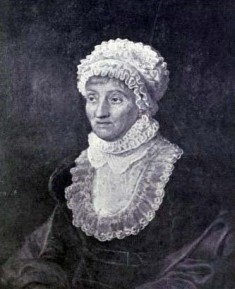| Caroline Herschel | |
|---|---|
 |
|
| Astronomer | |
| Specialty | Comets |
| Born | Mar. 16, 1750 Hanover |
| Died | Jan. 9, 1848 (at age 97) Hanover |
| Nationality | German-British |
Caroline Herschel was a German-British astronomer. She worked for most of her active career with her brother, Sir William Herschel. She was one of the first female scientists to be recognized for her work, and was important in the discovery of a number of comets. One of these was named partly in her honor. Herschel never married, partly on account of the after-effects of contracting typhus in childhood, but instead devoted her life entirely to astronomy.
Early Life
Herschel was born into a family of modest means in the German city of Hanover on March 16, 1750. Her father was a gardener, but also had a love of music, and this eventually allowed him to obtain a job as a Prussian Army bandsman. He hoped that all his children, male and female, would learn music, French, and mathematics.
Caroline, however, was treated as a servant by her mother, and only her father’s personal intervention and help allowed her the opportunity to study. After contracting typhus, which meant she was just 51 inches in height in adulthood, Caroline was told she would be an “old maid” for life because nobody would want to marry her.
Building an Interest in Astronomy
In 1772, William Herschel took Caroline with him when he went to live in the English city of Bath. He asked her to be his housekeeper there, but on much better terms than their mother had given her. He also taught her to sing, and her talent showed itself in that she became a noted soprano in the city.
William himself had become a renowned musician, paid around $650 a year for his work as a chorus director. However, he spent much of his spare time indulging a private passion for astronomy. He was particularly interested in observing deep space, and to this end he built a number of powerful telescopes at his private observatory.
William Herschel quickly became renowned in England for his telescope construction skills, and he was able to devote himself full-time to astronomy after King George III granted him a pension. Although he became highly successful and sold many telescopes, Caroline was not at this point particularly interested in joining her brother in his research. Despite some further study of mathematics, she remained primarily William’s house maid. She did, however, gradually take on a role of a business assistant, and spent long periods polishing and grinding the mirrors.
Contributions to Astronomy
As time went on, Caroline’s interest in astronomy grew, and in 1782 she became her brother’s apprentice. Her experience of polishing had given her some knowledge of the mechanical intricacies of telescopes, and the knowledge that she was being useful helped her to become more self-confident. After a while, she began to take on some of William’s work when he was compelled to go away on business. Visitors to the observatory were won over by Caroline Herschel’s knowledge and ability. The King granted her a pension, albeit a much smaller one than her brother’s. This marked the first time that a female scientist had her work officially recognized.
Nebulae and Comets
After her brother had given her a small telescope of her own, Herschel spent much of her time hunting for comets, an interest she shared with the majority of astronomers of the period. Despite her studies in mathematics, she never learned her multiplication tables by heart, and she would refer to them using a small sheet of paper.
She published a mass of positional data regarding comets and nebulae, both those discovered by William and some which she had discovered in her own right. William, meanwhile, had become still more famous owing to his discovery of Uranus, the first new planet to be found since ancient times. Caroline earned prestige of her own when she discovered a new comet.
After her brother married, Caroline felt somewhat lonely, but she continued to work at the observatory, and she was the discoverer of seven other comets. However, William’s death in 1822 left her so distressed that she felt unable to continue her scientific work. She moved back to Germany to live with Dietrich, her younger brother, in Hanover.
Legacy and Death
Caroline spent her retirement making a detailed catalog listing all the discoveries that both she and her brother had made during their time in England. This was welcomed by British astronomers and the Royal Astronomical Society made Herschel an honorary member. She was a popular figure in both England and Germany in her old age, eventually dying on January 9, 1848 at age 97.